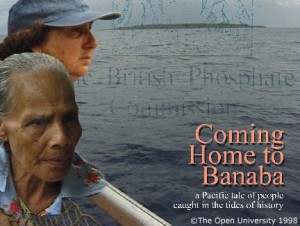‘Coming Home to Banaba’
 Coming Home to Banaba – Images and quotes – Transcript – The Making of …
Coming Home to Banaba – Images and quotes – Transcript – The Making of …
The TV Programme
This TV 30′ documentary was first broadcast in the UK on the BBC2 national network on Friday, August 21st 1998 as part of the Open University course “Pacific Studies”. It was broadcast at least once per year until the Open University ceased broadcasting course-related programmes in January 2007.
Coming Home to Banaba was screened at the 6th International Festival of Ethnographic Film at Goldsmiths College, University of London, on September 19th 1998.
Watch the programme
- Coming Home to Banaba (original English language version)
- Okiran Mwengara ae Banaba (Gilbertese/Banaban language version: produced and distributed for non-broadcast, non-commercial use under licence from the Open University)
The Background
Banaba is a remote and tiny island in the Pacific Ocean, about 50-miles South of the Equator, at the Western limit of the Republic of Kiribati.
Once it was known as Ocean Island, named after ship that “discovered” it. Once it was the colonial capital of the Gilbert and Ellice Islands, and one of the British Empire’s richest sources of phosphate, the raw material for the fertiliser that enriched the soil of Australia and New Zealand.
From 1900 to 1979, phosphate mining devastated Banaba, leaving a landscape of barren coral outcrops and rusting machinery.
Most Banabans now live in Fiji, two thousand miles away from Banaba, on Rabi Island (pronounced ‘Rambi’) to which the British exiled them in 1945, after three years of intense suffering under Japanese occupation.
In July 1997, a small group of Banabans and ex-miners made a return journey to the island that was once their home.
This 30-minute TV documentary tells the story.
- Images and quotes from the programme
- Programme Transcript
- The Making of Coming Home to Banaba. The programme was shot on a relatively low budget, using DVCAM format cameras (for the first time on location by a BBC-OUPC crew) by a team of two: this account provides more information how it was done, and how the programme idea developed.
- Alan and Jeremy do the South Pacific – prepared for Alan Marlow’s retirement party, August 2020
Coming Home to Banaba
was produced by BBC Television for The Open University
as a component of the Open University course “D332 Pacific Studies”, which is no longer offered.
Production Credits
Cameras and Sound
Alan Marlow and Jeremy Cooper
Dubbing Mixer
Martin Tillman
Off-Line Video Editor
Denise Taylor
Written and produced by
Jeremy Cooper
+44 (0) 1908 226118
© The Open University 1998